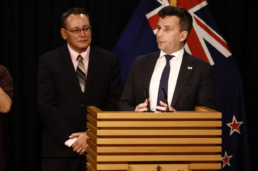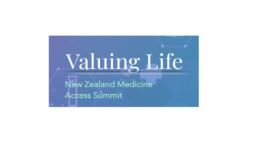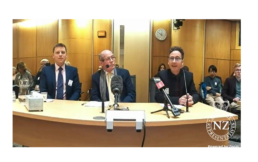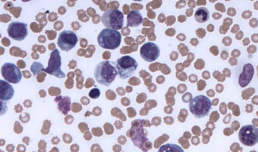More blood cancer drugs move falls short, says Dr Rodger Tiedemann
Close to 4000 people with blood cancer and blood-related disorders are expected to benefit from a move to buy more medicines, but a haematologist says New Zealanders will continue to die early until more modern medicines are funded.
Dr Rodger Tiedemann said the announcement reflected "one small step for patients, one giant deal for Pharmac,".
Read more here: here
New medicine funding something to celebrate - but there’s a long way to go
Rodger Tiedemann, an associate professor of medicine at the University of Auckland and a consultant haematologist with Auckland Hospital’s cancer and blood service, highlights the critical underinvestment in modern medicines in New Zealand.
He commends the coalition Government's recent pledge to allocate $642 million over the next four years for new cancer treatments and non-cancer medicines, which is expected to benefit thousands of New Zealanders.
However, he underscores that despite this investment, New Zealand remains significantly behind other OECD countries in medicine reimbursement, reflecting chronic underfunding. This gap has led to limited access to life-extending and curative treatments, necessitating further substantial investment to bring the country's healthcare up to par with global standards.
Read the full article here
Government U-turn: Coalition mends broken promise with 54 new drugs funded
In a major U-turn, the Coalition Government has announced it will not only fulfil its promise of funding 13 cancer drugs but extend the funding to an additional 41 medicines.
However, not all of the treatments will be available as soon as cancer patients hoped.
Health Minister Dr Shane Reti and Associate Health Minister David Seymour announced on Monday the Government will spend $604 million to fund 54 new medicines - made up of 26 cancer drugs and 28 other treatments.
"Today we are delivering on the therapies we promised and more, with an unprecedented and transformative investment in cancer and other treatments," Dr Reti said.
"This will be a mix of new medicines and widened access to medicines that are already available."
The additional cancer treatments announced today have not been named, however, the Government said it includes medicines for blood cancers and other tumours. The other treatments could cover infections, respiratory conditions, osteoporosis, sexual health, dermatology, inflammatory conditions, and mental health.
Read the full article here
Open Letter to Prime Minister
In August last year, a promise was made to fund 13 new cancer medicines via a $280 million fund to Pharmac, starting July 1 this year.
These medicines, crucial for treating cancers such as lung, bowel, kidney, melanoma, and head and neck cancers, are already available in Australia. However, the recent budget announcement has left cancer patients and advocates in disbelief, as it appears these medicines may not be funded for at least another year.
Read the Letter to Prime Minister Chistopher Luxon, Minister of Finance Nicola Willis, and the Associate Minister of Health (Pharmac) David Seymour here: Open Letter
Valuing Life - New Zealand Medicine Access Summit
Diane Ward, a dedicated advocate and trustee for CLL Advocates, and Catherine Isaac our CLL chair, attended the prestigious Valuing Life Summit at Parliament’s Grand Hall. This event marked a significant milestone in healthcare collaboration in New Zealand.
To delve deeper into their insights and experiences at the summit, you can explore Diane's comprehensive summary here: Valuing Life Summary
Clinical Trials for Chronic Lymphocytic Leukaemia
Clinical Trials.
In New Zealand, individuals diagnosed with Chronic Lymphocytic Leukaemia (CLL) have some options when considering clinical trials.
Patients can explore trials aiming to improve outcomes and quality of life for those with CLL. Additionally, New Zealand's participation in international collaborations provides access to a diverse range of clinical trials, offering patients the opportunity to contribute to cutting-edge research while potentially accessing innovative treatments.
Note:
If a study is not open in your area, discuss with your Haematologist if you can be referred to a centre where it is open.
Centres will usually consider cross referrals, although it will mean some travel.
Sometimes for commercial studies the cost of travel and accommodation may be paid.
Please click on this link, Clinical_ Trials for information on available trials
A tribute to Dr Ben Schrader, former Trustee of CLL Advocates NZ
A tribute to Dr Ben Schrader, former Trustee of CLL Advocates NZ

Ben Schrader (19 July 1964 – 19 April 2024), was a brilliant, award-winning New Zealand historian, and a founding trustee of CLL Advocates. Ben was diagnosed with CLL in 2012 and joined Neil Graham, Gillian Corbett and Rebecca Graham in establishing our Trust in March 2019. Despite being in and out of remission over the following years, he continued to give his time to advocating for the needs of New Zealanders with CLL.
Ben was a lovely, generous, gentle man who was happy to serve as a backroom worker, but ended up playing a major role in several key public CLL Advocates initiatives. He led CLLers in a multi-patient group march on Parliament in 2019, presenting our petition on the steps of Parliament, calling for the Government to approve funding of ibrutinib and venetoclax. Ben appeared with Neil Graham and Rob Weinkove before a Health Select Committee hearing on the petition, presenting on our cause. In 2021 he appeared before the Pharmac Review Panel to make our case for the reform of Pharmac processes and funding. In 2022 Ben helped bring together our submission on the Pae Ora Bill, and made an oral submission to the Pae Ora Select Committee.
Each of these required a great deal of time, skill and courage, and we are very grateful to Ben for this and for the moral support he gave to our cause. Ben stepped down from his role as a Trustee recently due to his deteriorating health.
We send our deepest sympathy to Ben’s family.
Pharmac anounces huge step forward in cancer drug-funding process - Dr Ruth Spearing
OPINION
Last week the minister responsible for Pharmac David Seymour announced that the agency would be able to consider applications for funding of a drug at the same time as it is being considered by Medsafe.
This is a good step forward in speeding up the process of getting new cancer drugs to New Zealanders.
The Government has also promised that the top 13 drugs recommended for funding by the European Society for Medical Oncology will be funded.
This is also good progress but unfortunately this list did not include any drugs for patients with blood cancers, as the society has not yet reviewed these drugs.
This creates a real equity issue: an estimated 21,000 New Zealanders are currently living with blood cancer and every day eight children and adults in New Zealand are diagnosed with a blood cancer. The plight of many quite young patients living with myeloma has recently been highlighted and it is important that this group of patients is not overlooked.
Addressing this issue is one of many substantial reforms of Pharmac that are essential if New Zealand is to move towards having similar access to lifesaving medicines as other countries with a similar GDP per capita.
Thousands of patients suffering from blood cancer will not benefit from the new drugs.
One high priority for reform that is less well understood by the public is the negative impact the chronic underfunding and the lack of flexibility of Pharmac has had on New Zealand’s ability to take part in groundbreaking clinical trials.
New Zealand is so far behind the rest of the OECD countries that the “standard of care” drugs against which these new drugs are benchmarked in the trials are not funded, and so, sadly, these groundbreaking trials are now increasingly not offered to New Zealand.
Particularly important are clinician-initiated trials (as opposed to pharmaceutical company trials), as they will look not only at new drugs but also, for example, the use of new molecular or imaging techniques to assess response, enabling some treatment courses to be safely shortened, with fewer associated side-effects and less cost. On very rare occasions Pharmac has supported such trials.
As an example, Pharmac approved the District Health Boards purchasing a drug which enabled New Zealand to take part in an international trial for Acute Myeloid Leukaemia, run out of the United Kingdom.
This decision paid off very well, with the DHBs needing to undertake fewer highly expensive stem cell transplants, gaining $4.5 million of free, now FDA-approved drugs, $76,000 worth of free molecular testing, and the best outcomes for this devastating condition that New Zealand has ever had.
The outstanding return on investment on these types of trials is supported by independent studies such as the KPMG report into Australian clinical research which concluded clinician-initiated trials delivers outstanding return on investment with a $78 billion net gain to the Australian economy. One trial had a massive return of 6,465 per cent.
Why would any organisation or country not invest in and support health-related activities with such a return?
However, when the results and financial gains of the UK leukaemia trial were presented to the chief executive of Pharmac, Sarah Fitt, her reaction was “that isn’t something Pharmac will be doing again”. Sadly, as a result, that was the last of the UK Acute Myeloid Leukaemia trials that New Zealand has been able to offer patients.
Read More
- Terminal cancer patient whose drugs are not funded ...
- Lack of funding for cancer medicines forcing Whanganui ...
- Terminally ill dad saves more than $200k bringing in ...
- The Front Page: Why NZ lags behind Australia on cancer ...
- New Pharmac-funded drug will help in the cancer battle ...
- 'Medicine crisis': Husband who lost his wife to breast ...
Support of these clinical trials is of paramount importance as they save lives - and money. It’s a win-win for all. Greater flexibility within Pharmac and within Health New Zealand to support national trials is essential.
Leaders from the Australasia’s leading blood cancer research group, the Australasian Leukaemia and Lymphoma Group, are gathering in Wellington next week to discuss clinical trials in NZ.
They will be making the case for these changes. It is to be hoped that, with vision and appreciation of both the health and economic value of clinical trials, the Government will seize the opportunity to support this critical pathway to improving life outcomes for New Zealand patients.
Dr Ruth Spearing, CNZM, is a haematologist and medical researcher for blood cancers
Dr Ruth Spearing - Why reform of Pharmac is vital
Dr Ruth Spearing, CNZM, is a haematologist and medical researcher for blood cancers, and a trustee for CLL Advocates NZ.
We are living in exciting times in terms of potential treatments for these cancers which include leukaemia, myeloma and lymphoma. The research done by the joint efforts of clinicians, scientists and patients together has shown that many cancers can now be completely cured or at least controlled for increasingly long periods of time.
Read the full article here: Dr Ruth Spearing - Why reform of Pharmac is vital
Combo of drugs could be used to treat Chronic Lymphocytic Leukaemia patients
A medicine regime that can be taken at home could mean patients suffering from chronic lymphocytic leukaemia will be much less likely to need hospital chemotherapy.
About 320 people are diagnosed in New Zealand each year with chronic lymphocytic leukaemia - referred to as CLL.
It is the most common form of leukaemia in this country.
But two major leukaemia studies presented at a recent global blood cancer conference in December, the American Society of Haematology, have shown the use of the drug IMBRUVICA in combination with venetoclax can be successful as a first option of treatment for CLL patients.
The drugs have been used to treat CLL separately but the two recent studies - named CAPTIVATE and GLOW - found their combination was highly successful in treating patients.
Patients took the drugs over 15 months and 97 per cent in one study and 84.5 per cent in the other were still alive after five years.
Listen to haematologist Dr Sharon Jackson from Middlemore Hospital and patient Kylie Soo, who is now in remission discuss the treatment regime: Combo of drugs could be used to treat leukaemia patients








